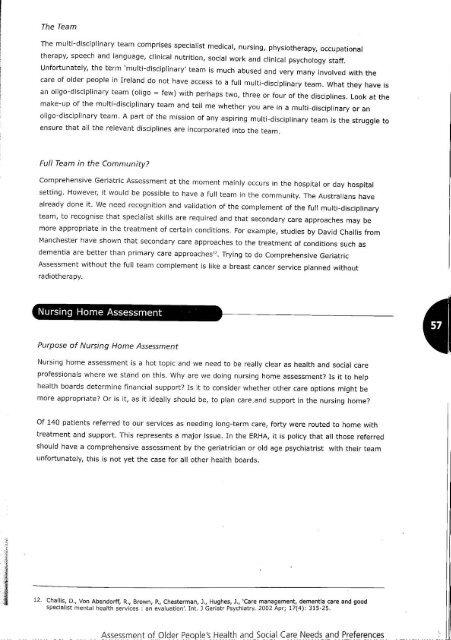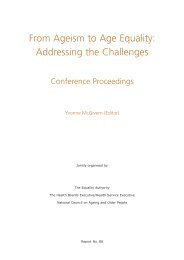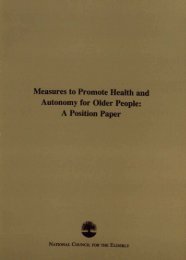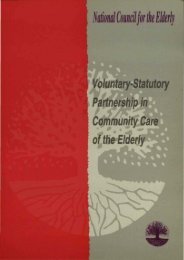Assessment of Older People's Health and Social Care Needs and ...
Assessment of Older People's Health and Social Care Needs and ...
Assessment of Older People's Health and Social Care Needs and ...
- No tags were found...
You also want an ePaper? Increase the reach of your titles
YUMPU automatically turns print PDFs into web optimized ePapers that Google loves.
<strong>Assessment</strong> <strong>of</strong><strong>Older</strong> <strong>People's</strong> <strong>Health</strong> <strong>and</strong> SocLal <strong>Care</strong> <strong>Needs</strong>_ <strong>and</strong> P!eferences.The TeamThe multi-disciplinary team comprises specialist medical, nursing, physiotherapy, occupationaltherapy, speech <strong>and</strong> language, clinical nutrition, social work <strong>and</strong> clinical psychology staff.Unfortunately, the term 'multi-disciplinary' team is much abused <strong>and</strong> very many involved with thecare <strong>of</strong> older people in Irel<strong>and</strong> do not have access to a full multi-disciplinary team. What they have isan oligo-disciplinary team (oligo = few) with perhaps two, three or four <strong>of</strong> the disciplines. Look at themake-up <strong>of</strong> the multi-disciplinary team <strong>and</strong> tell me whether you are in a multi-disciplinary or anoligo-disciplinary team. A part <strong>of</strong> the mission <strong>of</strong> any aspiring multi-disciplinary team is the struggle toensure that all the relevant disciplines are incorporated into the team.Full Team in the Community?Comprehensive Geriatric <strong>Assessment</strong> at the moment mainly occurs in the hospitai or day hospitalsetting. However, it would be possible to have a full team in the community. The Australians havealready done it. We need recognition <strong>and</strong> validation <strong>of</strong> the complement <strong>of</strong> the full multi-disciplinaryteam, to recognise that specialist skills are required <strong>and</strong> that secondary care approaches may bemore appropriate in the treatment <strong>of</strong> certain conditions. For example, studies by David Challis fromManchester have shown that secondary care approaches to the treatment <strong>of</strong> conditions such asdementia are better than primary care approaches". Trying to do Comprehensive Geriatric<strong>Assessment</strong> without the full team complement is like a breast cancer service planned withoutradiotherapy.Nursing Home <strong>Assessment</strong>Purpose <strong>of</strong> Nursing Home <strong>Assessment</strong>Nursing home assessment is a hot topic <strong>and</strong> we need to be really clear as health <strong>and</strong> social carepr<strong>of</strong>essionals where we st<strong>and</strong> on this. Why are we doing nursing home assessment? Is it to helphealth boards determine financial support? Is it to consider whether other care options might bemore appropriate? Or is it, as it ideally should be, to plan care.<strong>and</strong> support in the nursing home?Of 140 patients referred to our services as needing long-term care, forty were routed to home withtreatment <strong>and</strong> support. This represents a major issue. In the ERHA, it is policy that all those referredshould have a comprehensive assessment by the geriatrician or old age psychiatrist with their teamunfortunately, this is not yet the case for all other health boards.12. Challis, D., Van Abendorff, R., Brown, P., Chesterman, J., Hughes, J., '<strong>Care</strong> management, dementia care <strong>and</strong> goodspecialist mental health services: an evaluation'. Int. J Geriatr Psychiatry. 2002 Apr; 17(4): 315-25.















